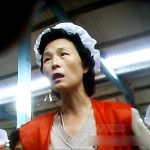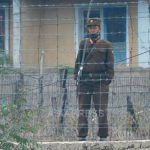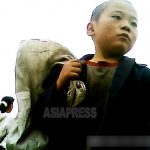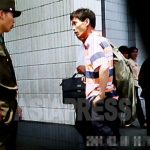2011/August/21
Report by Kim Dong-cheol

(Taken by Kim dong-cheol. February 2011, North Pyongan Province)
(C) ASIAPRESS
While the government growls about socialism, the number of 'unemployed people' is increasing.
This February, I visited a coal-mining town in North-Pyongan Province. It was a cloudy, bitter winter's day. I met two men there. They were wandering in rags, looking for work. Both had lost their home and were living on the streets. These homeless people are called 'kotchebi'.
Of course, homelessness and unemployment don't officially exist in our socialist country.
I approached them in a friendly way. The man said he was 50 years old. Thanks to his soot-blackened and heavily-creased face, he looked much older. He slowly began to talk.
"The government confiscated my house. So I'm living on the street. All my family is already dead. I now manage to get by on collecting pieces of coal. I can only get a small amount by selling them. But this is the only way I can survive."
I asked how he lost his house, and he started to explain in a weak voice.
" Last year, I was working at a Jato. One of the bosses from the state-owned coal-mining enterprise that I was meant to belong to learned about that fact. So I was told to leave the house if I was going to keep working at the jato."
A 'jato' is a half-privatized small coal-mining enterprise. The number of this type of company has increased rapidly in our country's mining areas in recent years. They are run by different kinds of groups. Some are higher ranking officials, while others are members of the nouveau-riche who have accumulated money from within the collapsed and confused economy.

(Taken by Kim dong-cheol. February 2011, North Pyongan Province)
(C) ASIAPRESS
They invest in abandoned state-run coal mines and employ workers directly. They are run on a stand-alone basis. Workers are paid according to their work.
This system motivates workers far more than state-run mines, and leads to higher productivity. Thus, there are many people who want to work in a jato.
Only people with good connections in the state bureaucracy and state institutions can do this kind of business.
On the other hand, state-run mining productivity long ago started to decline due to energy shortages and unpredictable state policy. Delayed salaries and absent rations lead to low motivation.
The man told that he became homeless a year ago. The real reason he lost all his property was because of the redenomination. The state introduced the sudden devaluation of the currency in November, 2009. Exchange into new currency was capped.
He could hardly live on his income from the state-run mine, while his wife somehow maintained the household. But soon he lost his wife, and his daughter drowned in a river while collecting clams.
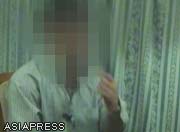
Kim is in his thirties and lives in the northern region of North Korea. He started his journalistic activities in 2009 while working as a company driver.
The other man, who was 46, said that he had also been expelled from his home for working at a jato.
I have asked him how he was going to live. He replied with a bitter look.
"I don't want to continue this hand-to-mouth life as a homeless man. Any job is fine for me. I could be a coal carrier, or, if you know any jobs, I'll do whatever."
Both of them certainly are 'unemployed' men. Our country's labor system functions by dispatching all male adults to registered workplaces. It eventually collapsed. The state can not guarantee workers food rations and salaries in compensation for their labor. Thus, workers move to jatos in order to make a living.
As a result of the expansion of the market economy centered around the jangmadang, where abundant goods and items are always being dealt, people have come to live on their own, not relying on the state. However, at the same time, this has meant that people are now in a fierce battle for survival.
The state still clings to the socialist command economy while the market economy grows with dizzying speed. And these men are the sport in this collapsed social system. I feel so sad for them, and so sad for my country.
Other reporters' PROFILES
(Written by Kim Dong-cheol, July, 2011)
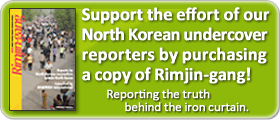 * Editor's notes on North Korean reporters
* Editor's notes on North Korean reporters
ALL REPORTS >>>
ARCHIVE(pdf) >>


